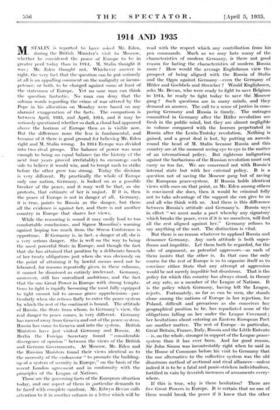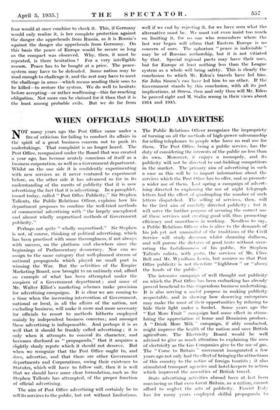1914 AND 1935
M• STALIN is reported to have asked Mr. Eden, during the British Minister's visit to Moscow, 14; hether he considered the peace of Europe to be in greater peril today than in 1914. M. Stalin thought it was ; Mr. Eden thought not.. Whichever answer is right, the very fact that the question can be put seriously at all is an appalling comment on the malignity or incom- petence, or both, to be charged against some at least of the statesmen of Europe. Yet no sane man can think the question fantastic. No ..man ,can deny that the solemn words regarding the crime of war Uttered by the Pope in his allocution on Monday were based on any alarmist exaggeration of the facts. The comparison is between April, 1935, and April, 1914, and it may be seriously questioned whether so dark a cloud had appeared above the horizon of Europe then as is visible now. But the difference none the less is fundamental, and ' because of it there is good ground kr believing Mr. Eden right and M. Stalin wrong. In 1914 Europe was divided into two rival groups. The balance of power was near -enough to being an equal balance (as the history ef the next four years proved irrefutably) to encourage each side to believe it would win, and to tempt each to strike before the other grew too strong. Today the division is very different. By practically the whole of Europe only one nation, Germany, is looked on as a possible breaker of the peace, and it may well be that, as she protests, that estimate of her is unjust. If it is, then the peace of Europe is not in danger at all. Germany, it is true, points to Russia as the danger, but there all the evidence is against her, and there is not another country in Europe that shares her views.
While the reasoning is sound it may easily lead to too comfortable conclusions, and Signor Mussolini's warning against hoping too much from the Stresa Conference is opportune. If Germany is, in fact, a danger at all, she is a very serious danger. She is well on the way to being the most powerful State in Europe, and though the fact that she has attained that position by a deliberate breach of her treaty obligations just when she was obviously on the point of attaining it by lawful means need not be laboured, for reasons repeatedly given in these columns, it cannot be dismissed as entirely irrelevant. Germany, 'moreover, still has unrealized 'ambitions, and the fact that the one Great Power in Europe with strong tempta- tions to fight is rapidly becoming the most fully equipped to fight cannot fail to arouse 'grave apprehension—par- ticularly when she refuses flatly to enter the peace-system by which the rest of the continent is bound. The attitude Of Russia, the State from whom, in Germany's view, the real danger -to peace comes, is very different. Germany has movedaway from Geneva and out of the peace-system. Russia has conic to Geneva and into the system. British Ministers have just visited Germany and Russia. At Berlin the Foreign Secretary found "considerable divergence of opinion' between the views of the British and German Governments. At Moscow, Mr. Eden and the Russian Ministers found their views identical as to the necessity of the endeavour "to promote the building- Up of a system of security ill Europe," on the basis of the recent London agreement and in *conformity with the principles of the League of Nations.
Those are the governing facts of the European situation 'today, and one aspect of them in particular demands to be faced with complete candour. Mr. Edwyn Bevan calls attention to it in another column in a letter which will be read with the respect which any contributiOn from his pen commands. Much as we may hate many of the characteristics. of modern Germany, is there not good reason for hating the characteristics of modern .Russia more ? How would the average Englishman view the prospect of being aligned with the Russia of Stalin and the Ogpus against GerMany—even the GerraaTh HY. of Hitler and Goebbels and Streicher ? Would Englishmen, asks Mr. Bevan, who were ready to fight to save selgium in 1914, be ready to fight today to save the. Moscow gang ? Such questions are in many minds, . a.n4 they demand an answer. The call to a sense of justice in com- paring Germany and Russia is timely. The outrages committed in Germany after the Hitler revolution are fresh in the public Mind, but they are almost negligible ill volume compared with the horrors perpetrated_ in Russia after the Lenin-Trotsky revolution. Nothing is gained, and a great deal is lost, by putting an aureole round the head of M. Stalin because Russia and this country are at the moment seeing eye to eye in the Matter of an international policy. But righteous indignation against the barbarisms of the Russian revolution must not carry us too far. We are concerned not with Russia's internal state but with her external policy. It is a question not of saving the Moscow gang but of saving the European peace-system. If Russia holds identical views with ours on that point, as Mr. Eden among others is convinced she does, then it would be criminal folly not to take advantage of the support she can give to us and all who think with us. And there is this difference between Russia's attitude and Germany's. Russia says in effect "we must make a pact whereby any signatory which breaks the peace, even if it is we ourselves, will find all the rest aligned against her." Germany refuses to say anything of the sort. The distinction is vital.
But there is no reason whatever to applaud Russia and denounce Germany. Any such attitude is both super- fluous and impolitic. Let them both be regarded, for the sake of argument, as potential aggressors—as each of them insists that the other is. In that case the only course for the rest of Europe is so to organize itself as to convince either State that any attempt at aggression would be not merely impolitic but disastrous. That is the policy for which this country has always stood, in theory at any rate, as a member of the League of Nations. It is the policy which Germany, having left the League, rejects. Fortunately, so far as can be seen, she stands alone among the nations of Europe in her rejection, for Poland, difficult and precarious as she conceives her geographical position to be, has repudiated none of the obligations falling on her under the League Covenant ; her hesitations about entering an Eastern European Pact are another matter. The rest of Europe—in particular, Great Britain, France, Italy, Russia and the Little Entente --is, on the whole, stronger in support of the League peace- system than it has ever been. And for good reason. Sir John Simon was incontestably right when he said in the House of Commons before his visit to Germany that the one alternative to the collective system was the old disastrous method of sectional and rival alliances—unless indeed it is to be a fatal and panic-stricken individualism, fortified in vain by feverish increases of armaments every- where.
If this is true, why is there hesitation? There are five Great Powers in Europe. It is certain that no one of them would break the peace if it knew that the. other four would at once combine to check it. This, if Germany -would only realize it, is her complete protection against the danger she apprehends from Russia, as it is Russia's against the danger she apprehends from Germany. On this basis the peace of Europe would be secure so long as the compact was observed. Why, then, it must be repeated, is there hesitation ? For a very intelligible reason. Peace has to be bought at a price. The peace- system may have to be defended. Some nation may be mad enough to challenge it, and the rest may have to meet the challenge in arms—which means sending their sons to be killed—to restore the system. We do well to hesitate before accepting—or rather reaffirming—this far-reaching obligation. Not more can be claimed for it than that it is the least among probable evils. But we do far from well if we end by rejecting it, for we have seen what the alternative must be. We must not even insist too much on limiting it, for no one who remembers where the last war began will affirm that Eastern Europe is no concern of ours. The aphorism "peace is indivisible" may be of Russian authorship, but it is not vitiated by that. Special regional pacts may have their uses, but for Europe at least nothing less than the League system as a whole will bring safety. This is clearly the Conclusion to which Mr. Eden's travels have led him. Sir John Simon's can have led him to no other. If the Government stands by this conclusion, with all its just implications, at Stresa, then and only then will Mr. Eden be proved right and M. Stalin wrong in their views about 1914 and 1935.











































 Previous page
Previous page